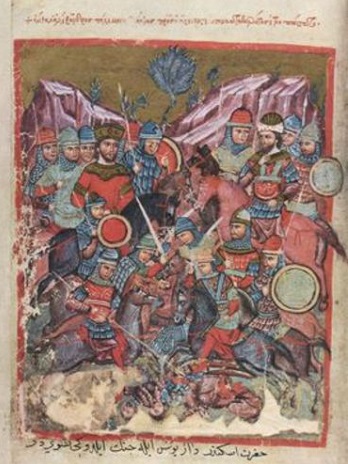The Close Racial Kinship Between the Greeks, Bulgarians, and Turks: Macedonia and Thrace By Dr. George Nakratzas
Click here to read the book
The book is in the PDF-format so you will need a PDF-reader, I suggest that you download Adobe Reader from http://www.adobe.com/
Here is the preface of the book:
PREFACE TO THE THIRD EDITION
The sole purpose of the first edition of this book was to give young Greeks another version of the origins of the modern Greek people, a rather different version, that runs counter to what has been taught in Greek schools for decades.
As the overtones of the modern Greek nationalist mythology gradually came into focus, culminating in such nationalist clichés as the assertion that ‘the Greek nation has no kin’, that the ‘Skopjans’ are ‘Gypsies’, or that the (Former Yugoslav) Republic of Macedonia is an ‘ethnic hotchpotch’, I was taken aback, and eventually got down to writing this, the third edition.
My hopes of doing what I could to set up an opposing force to this rampant nationalism have not been entirely in vain, considering that something like 3,000 copies have been sold all over the country. For a book of this nature, this is quite an achievement.
Viewed in the light of the general situation in Europe, Greece’s present foreign policy has shown that the country’s modern ideological armour is still very much the product of a nationalist upbringing, the roots of which go back to somewhere around the beginning of the nineteenth century. But the nation will never find its way in the European Union carrying this sort of ideological baggage.
One of the cornerstones of this ideology is the unrealistic theory that the modem Greeks, expressing as they do the enduring nature of the Greek language, are the biological descendants of the ancient Greeks. It was concocted in the eighteenth and nineteenth centuries to serve as an ideological arsenal in the efforts to create a modern Greek nation in view of the impending collapse of the feudal, theocratic Ottoman Empire. The philosophical challenge to theocracy as a social model of governance first emerged, together with the concept of human rights, in north-western Europe in the sixteenth century, the century of philosophical humanism that produced Erasmus, Shakespeare, and other great thinkers. In Greece, 400 years after the theocratic beliefs of the Middle Ages were first challenged (in 1967, to be precise), there was still talk of ‘the Greece of Greek Christians’; and even today we hear a great deal about ‘Greek Orthodox culture’ — a culture that has never in fact existed as such, being known rather as ‘Orthodox Eastern Roman culture’.
This country’s cultural backwardness has been starkly underlined by the efforts of modern Greek society to use the institution of the European City of Culture (Thessaloniki in 1997) to vaunt the mediaeval ideal of the Orthodox Eastern Roman culture of Mount Athos, not only as a historical and cultural facet of the multiethnic Byzantine Empire, but also as a ‘Greek’ national and religious heritage. These efforts may even have been subsidised by the European Union, at a time when sixty per cent of the population of the Netherlands, one of the most religious countries in Europe, have officially rejected any form of religious doctrine.
A large segment of modern Greek society, which has never really embarked upon the process of ideological modernisation, oscillates desperately between modernism and Greek Orthodox fundamentalism, displaying an inherent inability to make any sort of ideological distinction between the terms ‘race’, nationality’, and ‘cultural or ethnic identity’. Apart from the fact that even well-respected journalists are engaged in daily attempts to convince the younger generation that we are directly descended from ‘our ancient forebears’, views that go against the theory of ‘one race, one religion, one nation’ are regarded as nationally reprehensible. It is on this theory that most Greeks base their belief that there are no minorities in our country, apart from the ‘Greek Moslems’ of Western Thrace. Greek citizens who have publicly proclaimed that they do not feel like Greeks but like ethnic Macedonians or ethnic Turks have been pursued and convicted by Greek justice, which just goes to show that modem Greek society not only fails to show the necessary respect for what is different, but cannot even tolerate it. And, being in the grip of a virulent Hellenocentric egomania, this same society, while denying Greek citizens the right to any ethnic identity other than Greek, constantly exhorts Greeks living in other countries to preserve their Greek ethnic identity.
Personally, I couldn’t care less what race the citizens of modern Greece belong to; the only purpose of this book is to show, and substantiate with written documentation, how rotten and historically untenable obsessive nationalism is, in the hope of infusing as many young people as possible with respect for the right to self-determination of every Greek citizen and every ethnic group that calls itself a minority, as long as the country’s laws and territorial integrity are respected.


